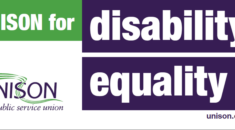Disabled employees working from home during lockdown say they have been more productive and took fewer days off sick than when they were doing their jobs in the office, according to a survey published today (Wednesday) by UNISON.
The union is now calling on the government to give disabled people a new right to work from home if they wish and for employers to face penalties if they don’t comply.
Disabled employees should have the right under equality laws* to ‘reasonable adjustments’ to reduce the effect of their disability, says UNISON.
This includes working from home, but UNISON has been told by workers that many employers argue this doesn’t count as a reasonable change to their employment arrangements.
Figures released by the union, based on responses from more than 4,000 disabled workers across the UK, show that half worked from home during the Covid-19 crisis. This is a huge increase on the one in twenty (5%) who say they usually do this.
Workers responding to the survey are providing public services in education, local government, the NHS, police service and energy, and employed in the public, voluntary and private sectors.
The survey found that nearly three quarters (73%) of disabled staff felt they were more productive or as productive working from home compared to their pre-lockdown place of work.
More than half (54%) felt they would benefit from working from home in the future, but nearly two in five (37%) believed their employer was unlikely to allow this.
UNISON says the findings show that many disabled workers are losing out by not being permitted to work from home.
However, the survey shows this arrangement can benefit employers as well as staff. Many of those who felt they were more productive working from home said they were taking fewer sick days as they were able to manage their condition better.
The ability to work flexibly, take short breaks to manage their health issues and easier toilet access were also reasons given by disabled people for working more productively and improving their wellbeing by working from home. They were also less likely to be exhausted and in pain from long commutes to work.
Many who felt they were less productive working from home said the reasons included a lack of reasonable adjustments to support them, such as adaptable keyboards and speech-to-text software.
More than half (53%) said they had received no reasonable adjustments from their employer to help them to work from home.
Only a minority (5%) had help from Access to Work, the government’s agency that funds adjustments for disabled workers.
UNISON has written to the Chancellor calling for increased government funding so Access to Work can help more people to do their jobs from home.
Comments from disabled workers who completed the survey included:
- “I have hearing loss in both ears. The quiet of the home enables me to hear and think more clearly.”
- “I live with bipolar. Working from home gives me a controlled quiet space with no distractions.”
- “I’m autistic and the office is a relentless sensory assault…At home I can take regular breaks and work in a room that is totally quiet.”
- “Two weeks ago, I was up at 4am in agony (with pain) …as I was working from home, I was able to do a full day’s work, and take a proper rest on my lunch.”
- “Able to fit work around life more easily with no worries on how often I go to the loo (due to Crohn’s disease).”
UNISON assistant general secretary Christina McAnea said: “This survey shows working from home can be done easily and actually increases productivity.
“The pandemic’s demonstrated that there’s no longer any excuse for employers to turn disabled workers down if they request to work from home.
“But one size doesn’t fit all and home working should be a choice. Disabled employees should continue to have the right to ask for reasonable changes that allow them to remain in the workplace.
“For those who want to do their job from home, it’s time to give disabled workers a new right to do so.”
Notes to editors:
– *Employers have a duty to provide changes – defined as ‘reasonable adjustments’ – to help disabled workers under the Equality Act 2010. These adjustments should remove/reduce the barriers disabled employees face so they can do their jobs.
– The UNISON survey was carried out between 5 and 21 June 2020 and based on responses from 4,455 working disabled members.
– Click here for a copy of the report.
– UNISON is the UK’s largest union, with more than 1.3 million members – including an estimated 200,000 disabled workers – providing public services in education, local government, the NHS, police service and energy. They are employed in the public, voluntary and private sectors.
Media contacts:
Sophie Goodchild M: 07767 325595 E: s.goodchild@unison.co.uk
Anthony Barnes M: 07834 864794 E: a.barnes@unison.co.uk


